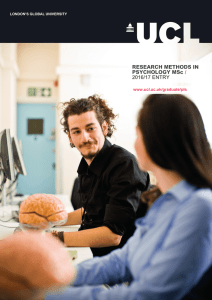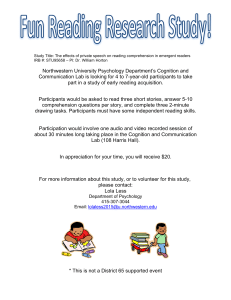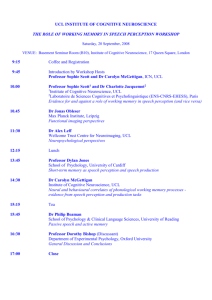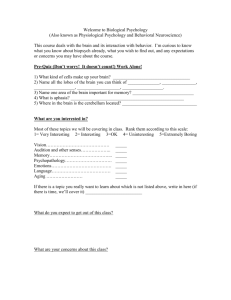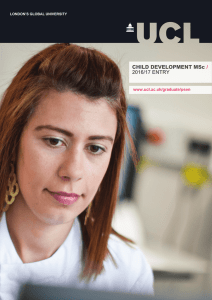SOCIAL COGNITION: RESEARCH AND APPLICATIONS MSc /
advertisement
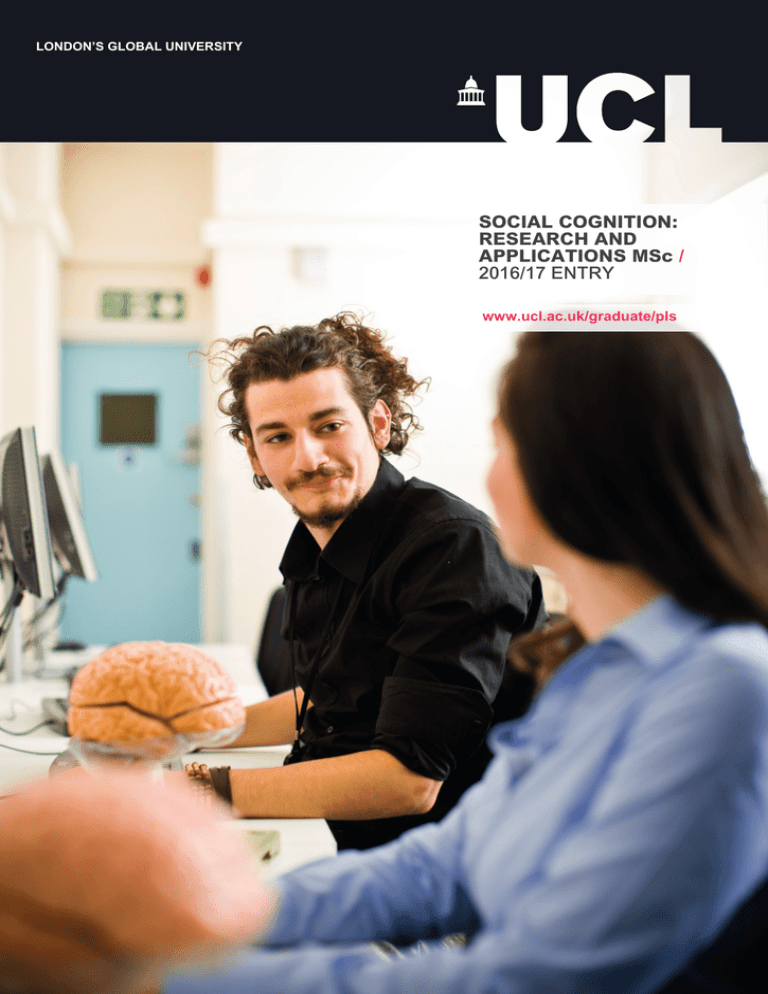
LONDON’S GLOBAL UNIVERSITY SOCIAL COGNITION: RESEARCH AND APPLICATIONS MSc / 2016/17 ENTRY www.ucl.ac.uk/graduate/pls Social Cognition: Research and Applications MSc / This MSc focuses on how individuals construe the social world and the processes that underlie social judgment and behaviour. The programme draws on the research of outstanding academic staff working in the areas of social psychology, neuroscience, and cognitive science to provide unique, cutting-edge perspectives on humans as social beings. Degree summary The programme provides an understanding of how the human emotional, cognitive and neural systems have evolved to sustain social coordination and adaptation to the environment. Key topics include: social perception, motivation, attitudes, embodiment, emotion, social judgment and decision making, and social neuroscience. // // // The Division of Psychology & Language Sciences undertakes world-leading research and teaching in mind, behaviour, and language. Our work attracts staff and students from around the world. Together they create an outstanding and vibrant environment, taking advantage of cutting-edge resources such as a behavioural neuroscience laboratory, a centre for brain imaging, and extensive laboratories for research in speech and language, perception, and cognition. Opportunities for graduate students to work with world-renowned researchers exist in all areas of investigation, from basic processes to applied research. The division offers a supportive environment including numerous specialist seminars, workshops, and guest lectures. The programme is delivered through lectures, tutorials and seminars. The Division of Psychology & Language Sciences has advanced technology for the study of socio-cognitive processes, including fMRI, eye-, speechand motion tracking equipment for dyadic and group settings, as well as a 360o video camera. Assessment is through coursework, online assessment and the dissertation. Degree structure Mode: Full-time: 1 year; Part-time: 2 years Students undertake modules to the value of 180 credits. The programme consists of six core modules (90 credits), two optional modules (30 credits), and a research dissertation (60 credits). CORE MODULES // Understanding Individuals and Groups // Social Cognition, Affect, and Motivation // Current Issues in Attitude Research // Social Neuroscience // Research Statistics // Social Cognition: Research Methods OPTIONS // Options may include the following: // Knowledge, Learning, and Inference // Applied Decision-making // Principles of Cognition // Human Learning and Memory // Social Psychology // Psychology and Education // The Psychology of Health // Organisational Psychology // Cognitive Neuroscience // Multimodal Communication and Cognition // Consumer Behaviour // Consulting Psychology // Business Psychology Seminars DISSERTATION/REPORT // All students undertake an independent research project which culminates in a dissertation of 10,000–12,000 words. Your career Graduates have taken up positions in research, marketing, teaching, and management consultancy. For more detailed careers information please visit the department website. Recent career destinations* include: // Google with Bon Apetit Food Management Company, Global Director of Food Choice Architecture, 2013 // // Metropolitan Police, Major Incident Room, 2012 Development and Behavioural Economics research projects in India, Project Associate, 2013 Employability On completion of this programme students will have acquired an understanding of the processes involved in the construction of the social reality, in particular how cognitive and affective processes guide social judgement and behaviour, and how these processes are implemented in the brain. The students will have acquired methodological skills to design and carry out socio-cognitive research, which will enable them to address real-world social problems and/or pursue an academic career. In addition, they will have acquired knowledge related to theoretical and philosophical issues underlying psychological research. * data taken from the ‘Destinations of Leavers from Higher Education’ survey undertaken by HESA looking at the destinations of UK and EU students in the 2010–2012 graduating cohorts six months after graduation and, where necessary, departmental records. Entry requirements A minimum of an upper second-class Bachelor's degree from a UK university or an overseas qualification of an equivalent standard. Students are expected to have a Bachelor's degree in Psychology. However, very good candidates in related areas, such as management, sociology, or communication sciences, will also be considered. Students should be prepared for the mathematical component contained in the MSc-level Research Statistics module. FEES AND FUNDING // UK & EU (2016/17) entry: £9,020 (FT) // Overseas (2016/17) entry: £23,020 (FT) // UK & EU (2016/17) entry: £4,510 (PT) // Overseas (2016/17) entry: £11,460 (PT) Full details of funding opportunities can be found on the UCL Scholarships website: www.ucl.ac.uk/scholarships English language proficiency level If your education has not been conducted in the English language, you will be expected to demonstrate evidence of an adequate level of English proficiency. The level of English language proficiency for this programme is: Good. Information about the evidence required, acceptable qualifications and test providers is provided at: www.ucl.ac.uk/graduate/english-requirements Your application The deadline for all applicants is 14 June 2016. Students are advised to apply as early as possible due to competition for places. Those applying for scholarship funding (particularly overseas applicants) should take note of application deadlines. When we assess your application we would like to learn: // // // // why you want to study Social Cognition at graduate level // where you would like to go professionally with your degree why you want to study Social Cognition at UCL what particularly attracts you to this programme how your academic and professional background meets the demands of this rigorous programme Together with essential academic requirements, the personal statement is your opportunity to illustrate whether your reasons for applying to this programme match what the programme will deliver. Details on how to apply are available on the website at: www.ucl.ac.uk/graduate/apply PDF Updated: May 25, 2016 Information correct at time of going to press. See website (www.ucl.ac.uk/pals) for latest information APPLICATION DATE All applicants: 14 June 2016 CONTACT Mrs Pia Horbacki Email: pgpsychadmissions@ucl.ac.uk Telephone: +44 (0)20 7679 5335
